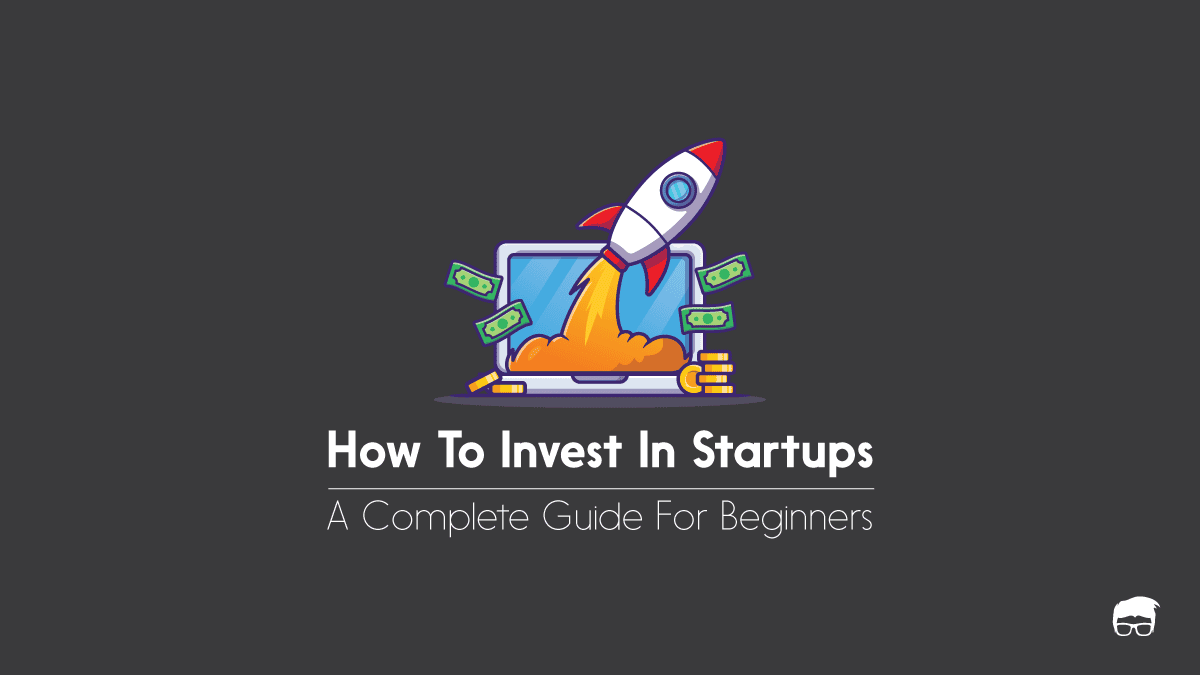Breaking news – $1,000 invested in XYZ startup a decade ago would have been $1M today.
We’ve all come across news like this – and thought, what does it take to find and invest in startups like these?
Well, a lot goes on behind the scenes in startup funding. And the majority of the time, it’s not even profitable. After all, only 10% of startups ultimately survive long-term.
So, before going on reading this guide on how to invest in a startup, know that you only invest the amount you’re comfortable losing (or getting tenfold if things go well).
But first, for those who are new to this startup ecosystem know that a startup is an entirely new entity than a regular new business –
What Exactly Is A Startup?
A startup is a fast-growing new business structure operating under extreme uncertainty aimed at solving a problem with a fresh approach powered by disruptive innovation.
Unlike traditional businesses, startups dive into the unknown. They innovate and take risks, often without a clear path forward.
The goal? To bring something new and valuable to the market, even when the future is uncertain.
When compared to a regular new business, a startup differs in three critical factors:
- Growth – A startup usually sees a hockey stick growth, which isn’t the case with a usual new small business. By hockey stick growth, we mean that a startup’s growth curve initially is slow, but quickly accelerates and hits a very steep curve. This rapid growth gives the startup the potential to become very successful and lucrative in a short period of time.
- Disruption – A startup is characterised by extreme disruption when it comes to the business model, solution, product, communication, or any other product dimension. A new small business, on the other hand, operates on the existing models laid down by previous startups.
- Uncertainty – A startup is full of uncertainty when it comes to its direction, revenue, and growth. A small business, on the other hand, is more certain due to its established business model and customer base.
What Investment Opportunities Do Startups Offer?
If you’re an individual investor, your chance of investing in a startup is usually at its-
- Pre-seed stage (when they have an idea and want money to convert that idea into a business)
- Seed stage (when they have a business but need money to sustain the initial growth)
During these stages, the token amount is usually low and can be anywhere from $10,000 to $5 million.
This money isn’t always invested in return for equity. In fact, there are several instruments of startup funding. These are –
- Equity Investments: Equity financing is when you demand equity (part of company’s ownership) in return for your money invested. The proportion of the ownership depends upon the amount invested and the company’s worth.
- Debt Investments: Debt financing is when you provide a startup with capital by purchasing debt instruments. These instruments include notes, bills, and bonds, and these come with interests instead of company ownership. It’s relatively less risky investment but the return can be less compared to equity financing too.
- Convertible Investments: It’s a short-term debt-cum-investment tool that you can choose to convert into common shares at a later time or an event when it is easier to determine the company’s valuation. There are several variations to this note made by big accelerators. These are –
- SAFE – Simple Agreement for Future Equity (SAFE), created by Y Combinato, is different from a usual convertible note as it isn’t exactly a debt instrument. It’s just a legal agreement where you’re guaranteed future shares in the company during future events like equity financing, a liquidity event, or a dissolution event.
- KISS – Keep It Simple Security (KISS), created by 500 Global, is a simplified version of a convertible note carrying maturity date and interest rates, but it automatically converts to preferred stock when a priced equity round (above a specified amount) occurs.
Ways To Invest In Startups
The biggest prerequisite to investing in a startup is to be ready to lose all. If you’re okay with that, here are some common ways to invest in startups:
Angel investing
If you’re a high-net-worth individual who can invest $10,000 to $5 million in innovative ideas, you can become an angel investor and invest in startups directly.
There’s no particular certification to become an angel investor, and you can simply be called one as soon as you invest in your first startup. But you can become an accredited investor (an investor legally allowed by the SEC to trade in unregistered securities) if your net worth is at least $1 million and you earn at least $200,000 per annum.
While your prospective investments mostly comes through references or word of mouth, here are some platforms that you can join as an angel investor to find startups for your portfolio –
- AngelList: With over 5 million members, AngelList is the largest community for startups and investors. It offers a curated list of investment opportunities and comprehensive due diligence to help you make informed decisions.
- Angel Investment Network: This platform boasts more than 300,000 investors and has helped raise over $300 million for startups. You can easily search for opportunities by location and industry to find what aligns with your interests.
- Gust: A global network used by 800,000 startups and 80,000 investment professionals. Gust has facilitated over $50 billion in funding. It also offers handy tools like a CRM, investor communications, and legal document management.
- StartEngine – One of the largest equity crowdfunding platforms in the US, having raised over $650 million for 500+ startups.
- Angel Investment Network – Global network of over 300,000 investors that has helped raise $300+ million.
- LetsVenture – A Popular startup funding platform in India.
However, it isn’t easy to be an angel investor, especially if you’re just starting out. You might want to join angel groups as –
- As a first-time angel investor, finding promising startups with less chances of failure is challenging.
- Investing in companies abroad is a task and requires additional costs. For example, if you’re an investor from Singapore and want to invest in the USA, you might need to
- Create a U.S.-based entity, such as a Delaware LLC or corporation, to make investments.
- Consult with US tax advisors to understand potential tax treaty benefits between Singapore and the US and structure investments to optimise tax treatment.
- Consult with an EB5 visa attorney if you wish to obtain permanent residency in the United States through the EB-5 Immigrant Investor Program.
Venture capital Firms
A venture capital firm is an organisation that pools money from several angel investors, corporates, and institutions to invest in high-growth startups, usually at the Series A stage or later.
Most VC investments are restricted to accredited investors who meet certain net worth or income thresholds. But if you’re one accredited investor, you might reach out to a few VCs through your network.
VCs are comparatively safer option compared to angel investing as they’re in business for long and only take calculated investments like investing in later rounds.
Also, according to statistics, good VCs saw average annual returns of 15-27% over the past ten years.
Crowdfunding
If you don’t have as big a pocket as an accredited investor, you can still invest in startups using crowdfunding platforms. These platforms are categorised into three types –
- Reward-based crowdfunding platforms: You either receive the product before the public or receive rewards such as concert tickets, t-shirts, mugs, pens and, coupons, etc., in return for your investments. Kickstarter is a good example of a reward-based crowdfunding website.
- Debt crowdfunding platforms: It’s just like debt financing. You invest in a startup and expect to be repaid with interest. LendingClub is one the popular debt crowdfunding websites.
- Equity crowdfunding platforms: On these platforms, startups raise money in return for equity of their business. A good example is Seedrs. This crowdfunding platform simplifies shareholder management through its nominee structure.
Startup Accelerators And Incubators
An incubator is a collaborative program, usually run by a nonprofit organisation, designed to help startups develop during their initial stages until they can sustain themselves in the market.
On the other hand, an accelerator is a for-profit organisation that provides young startups with short-term cohort-based programmes specifically tailored to promote years of growth within a few months.
As an investor, you can access numerous promising early-stage startups by partnering with reputed incubators and accelerators. Here are some reputed ones –
USA:
- Y Combinator
- Techstars
- 500 Startups
- AngelPad
- Plug and Play
- Google for Startups
India:
- Startup India
- T-Hub
- Nasscom 10,000 Startups
- Venture Catalysts
- CIIE IIMA
- Amity Innovation Incubator
Singapore:
- Antler
- Entrepreneur First
- Iterative
- StartupX
- Accelerating Asia
- ICE71
UK:
- Seedcamp
- Entrepreneur First
- Techstars London
- Founders Factory
- Bethnal Green Ventures
- Wayra UK
Secondary markets
Secondary markets allow you to buy and sell shares in private companies after the initial funding rounds.
In simple words, instead of the startup directly, you reach out to the shareholders of a startup like VC firms, existing angel investors, Limited Partners (LPs), etc. to buy company shares from them.
You either reach out to the shareholders directly or through private market platforms like Forge, Equityzen, SaxonWeber, Nasdaq private markets, etc.
How Much Can You Invest in Startups?
Although there isn’t a minimum or maximum amount that investors invest in a startup. For example, if you’re investing in a very early-stage startup, you can invest as much as $500 for 10-30% equity.
For a startup with good traction and initial revenue, even $5 million could give you less than 1% equity. It depends.
- The limit can range from $2,200 to $107,000 on equity crowdfunding platforms like SeedInvest.
- On Wefunder, individuals can invest as little as $100 at a time
- For angel investments, there is no definitive upper limit, but usual amounts range from $5,000 to $500,000, with some going up to $5 million
- For angel funds, especially in india, Individual investors must have net tangible assets of at least 2 crore rupees (excluding their primary residence).
- In the USA, if you’re a non-accredited investor and your annual income or net worth is less than $124,000, you can invest up to the greater of $2,500 or 5% of your annual income or net worth, whichever is less.
Tips for investing in startups
Investing in startups, especially early stage is a risky affair. Here are a few tips to help you get the most out of this opportunity.
- Seek professional advice: If you’re unsure where to start, speak with a financial advisor familiar with startup investing. They can help you avoid common mistakes and guide your strategy.
- Conduct thorough due diligence: Before you invest, dig deep. Review the startup’s business plan. Look at the market potential. Who’s the competition? It’s like buying a house—you wouldn’t sign the deal without checking for cracks in the foundation, right?
- Assess the founding team: The founders are key. Do they have the skills and experience to pull this off? More importantly, are they passionate? You want leaders who won’t bail when things get tough, because in startups, they will.
- Diversify your investments: Don’t put all your eggs in one basket. Spread your investments across different startups, industries, and stages. Some will fail, but the idea is for a few winners to make up for the losses.
- Start small: Think of your first investments as learning experiences. Start with small amounts. You’ll get a feel for how things work without risking too much upfront.
- Understand the risks: Most startups fail. That’s the hard truth. Be mentally prepared for the possibility of losing your entire investment. If that’s a dealbreaker, this might not be for you.
- Consider tax incentives: In the UK, look into the Seed Enterprise Investment Scheme (SEIS) or Enterprise Investment Scheme (EIS). These offer tax relief to offset some of your risks. It’s like getting a bit of a safety net.
- Use regulated platforms: In the USA, make sure you invest through SEC-regulated crowdfunding platforms like SeedInvest or Wefunder. These platforms help ensure everything’s above board legally.
- Know your investment limits: If you’re not an accredited investor in the USA, there are limits to how much you can invest. These limits are based on your income and net worth, so it’s smart to know your boundaries.
- Be patient: Startup investing isn’t a get-rich-quick game. It can take years—sometimes a decade—to see returns. If you expect quick cash, this isn’t the place to find it.
A startup consultant, digital marketer, traveller, and philomath. Aashish has worked with over 20 startups and successfully helped them ideate, raise money, and succeed. When not working, he can be found hiking, camping, and stargazing.

![How To Get Startup Funding [The Complete Guide] startup funding guide](https://feedough.com/wp-content/uploads/2022/08/startup-funding-guide.png)







